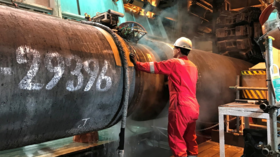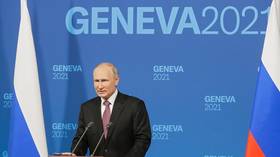Western European politicians arguing over whether to do business with Russia don’t seem to realize they really have no choice

Depending on who you ask, the vast Nord Stream II pipeline is either an opportunity for economic growth, or a malign attempt by Russia to undermine the EU. Now, as the project nears completion, it’s clear the politics isn’t over.
German Foreign Minister Heiko Maas has been one of the most prominent supporters of the Moscow-backed pipeline. As recently as the start of this month, he has warned about the potential cost and futility of trying to cut Russia off from the economic partnership, saying such an approach would be “wrong and dangerous.”
Nord Stream II, the country’s flagship energy project, has been the target of long-running sanctions from the US. However, in May, Washington said it would waive the restrictions imposed on many firms involved in laying the pipeline. However, that decision may soon be overturned, after a recent amendment passed in the House of Representatives seeking to force the US to block the pipeline. Politicians will have their own reasons, but it isn’t clear where this leaves a commitment to free trade.
Also on rt.com Will Germany be forced to pay Ukraine for non-existent gas transit from Russia? RT’s Boom Bust investigatesRussian gas in an explosive market
Nord Stream II is a natural gas pipeline that connects oilfields in Russia, the country with the world’s largest natural gas reserves, with Western Europe, a region with a relative scarcity of resources but high energy demand. Once completed, it will be among the world’s longest, running under the Baltic Sea and making landfall in Germany.
In 2019, natural gas made up the EU’s second-largest energy source, 41% of which came from Russia, more than from any other country.
While Russia may have the largest reserves, the United States is the country that produces the most natural gas, and Moscow’s pipelines to Europe have been in direct competition with American exports of liquefied natural gas (LNG) produced in the US and liquefied for transportation across the Atlantic. The EU has also been importing US-produced LNG since 2016 in order to diversify its supply, and, according to the European Commission, from 2016 to 2020, a total of 24 billion cubic meters arrived in Europe.
Nord Stream II, which begins in the St. Petersburg region and ends in northeastern Germany, is said to have the potential to transport 55 billion cubic meters of gas per year, says Nord Stream 2 AG. That’s more than nine times the yearly average of American LNG imported to the EU during that four-year period. The pipeline’s capacity, as well as how close Russia’s reserves are to Europe, compared to the US’ own gas fields, make it a highly competitive supplier. The EU might choose, for political, economic, or energy reasons, to diversify its trade with other partners, but it would be hard to justify entirely turning its back on Russia.
Also on rt.com ‘A good day for Russia’: Former US President Trump blasts successor Biden after Putin summit, citing waivers for Nord Stream-2Does the EU have a choice?
American and some European leaders have called for a suspension of the Nord Stream II pipeline and sanctions to be imposed on various entities tied to the project for a whole host of political reasons. The alleged poisoning and jailing of opposition figure Alexey Navalny and the stand-off across the border with Ukraine have both been suggested as grounds to scrap the multibillion-dollar project.
Ostensibly, the goal of forcing a last-minute retreat from Nord Stream II would be to create a loss for investors so as to discourage future support for Russian-led ventures and force Russia to re-commit to Ukraine as a transit point for natural gas. Kiev is currently arguing it stands to lose billions in transit fees as the pipeline will circumvent its borders. Ditching the deal would also push the EU towards other sources, its detractors likely believe, namely American LNG, but also renewable energy sources within the framework of the EU’s Green New Deal.
When it comes to natural gas reserves, Russia has a significant competitive advantage over other countries. Closing off Western European markets to Russian gas would not have a serious impact on Russia’s economy, but would effectively complete its repositioning towards Asia.
Despite that, barring them somehow achieving total self-sufficiency, Western European countries will continue to rely on Russian natural gas even as the US steps up its LNG exports.
However, Ukraine’s status as a transit point is far from guaranteed. The TurkStream pipeline, which began operations in January 2020 and runs through the Black Sea, supplies Turkey and Bulgaria with possible extensions reaching as far as Central Europe via the proposed Tesla pipeline. While Moscow has played down plans to cut off transit fees to Kiev, the issue is likely to continue to be one that will create political tensions.
With talk of a Green New Deal forever present, the rumblings of energy reform have caused investors to anticipate a drop in Russia’s significance within the European energy market. According to a poll conducted by the German-Russian Foreign Chamber of Commerce cited by the German business newspaper Handelsblatt, 48% of the 175 businesses that took part believe Moscow will become less important as an energy supplier against the backdrop of environmental policy.
For the time being, however, Europe is still dependent on crude oil and natural gas for its energy. Furthermore, the EU’s domestic natural gas production is set to drop by 43% in the next 12 years, which will have to be compensated for by turning to external sources.
As the first arm of the pipeline prepares to start pumping gas to Western Europe, it’s clear that the challenges for its supporters are far from settled. It remains to be seen whether geopolitical motives will be allowed to impede free trade. There is, of course, the argument that building strong trade ties helps guarantee peace on the continent. But, to buy into that, Western politicians would first have to agree to treat Russia as an equal.
Think your friends would be interested? Share this story!
The statements, views and opinions expressed in this column are solely those of the author and do not necessarily represent those of RT.
The statements, views and opinions expressed in this column are solely those of the author and do not necessarily represent those of RT.













